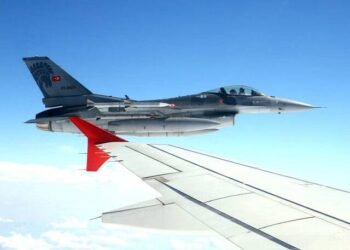ABOARD THE USS GERALD R. FORD (news agencies) — U.S. Defense Secretary Lloyd Austin flew out to the USS Gerald R. Ford aircraft carrier Wednesday to meet with the sailors he has ordered to remain at sea to prevent the Israel-Hamas war from spilling over into a deadlier regional conflict.
Austin was in the region to press Israel to shift its bombardment of Gaza to a more limited campaign and more quickly transition to address Palestinian civilians’ dire humanitarian needs.
At the same time, the U.S. has been concerned that Israel will launch a similar military operation along its northern border with Lebanon to expel Hezbollah militants there, potentially opening a second front and widening the war.
At a news conference in Tel Aviv on Monday, Austin didn’t say whether U.S. troops might be further extended to defend Israel if its campaign expands into Lebanon, and Israeli Defense Minister Yoav Gallant seemed to tone down recent rhetoric that a northern front was imminent, deferring to diplomatic efforts first.
Still, that leaves incredible uncertainty for the Ford and its crew, which Austin ordered to the Eastern Mediterranean to be closer to Israel the day after Hamas militants stormed into southern Israel on Oct. 7. The aircraft carrier’s more than 4,000 sailors and the accompanying warships were supposed to be home in early November.
Using the public address system of the Ford, which is sailing a few hundred miles off the coast of Israel, Austin thanked the sailors and their families for giving up spending the holidays together because of the mission.
“Sometimes our greatest achievements are the bad things we stop from happening,” Austin told the crew. “In a moment of huge tension in the region, you all have been the linchpin of preventing a wider regional conflict.”
The defense secretary met with a group of sailors in the Ford’s hangar bay to talk about the various dangers in the region that the carrier, the destroyers and the cruisers deployed along with it have been watching.
He thanked them for keeping attention on cross-border fighting between Israel and Hezbollah, and later told reporters traveling with him that if Israel transitions away from major combat operations in Gaza, it could possibly ease some of the regional tension that has kept the Ford in place.
The Ford’s commanding officer, Navy Capt. Rick Burgess, said one of the Ford’s main contributions has been to stay close enough to Israel that it can send its aircraft in to provide support, if needed. While the Ford’s fighter and surveillance aircraft are not contributing to the surveillance needs of Israel’s operations in Gaza, other ships in its strike group are, Burgess said.
The Ford is one of two U.S. carrier strike groups bracketing the conflict. The other, the USS Dwight D. Eisenhower, has recently patrolled near the Gulf of Aden, at the mouth of the Red Sea waterway where so many commercial vessels have come under attack in recent weeks.
Iranian-backed Houthis in nearby Yemen have vowed to continue striking commercial vessels transiting the Red Sea with ballistic missiles and drones until Israel ceases its devastating bombardment of Gaza, which has now killed more than 19,000 Palestinians.
To counter the ship attacks, Austin announced a new international maritime mission Tuesday to get countries to send their warships and other assets to the southern Red Sea, to protect the roughly 400 commercial vessels that transit the waterway daily.
Since it left Norfolk in the first week of May, the Ford’s fighter aircraft and surveillance planes have conducted more than 8,000 missions. The crew, Austin noted, has been moving at full speed — consuming more than 100,000 Monster energy drinks and 155,000 Red Bulls along the way.








 United Arab Emirates Dirham Exchange Rate
United Arab Emirates Dirham Exchange Rate

